人教版(2019)必修第二册 Unit 4 History and traditions Discovering Useful Structures 课件(共25张PPT)
文档属性
| 名称 | 人教版(2019)必修第二册 Unit 4 History and traditions Discovering Useful Structures 课件(共25张PPT) | 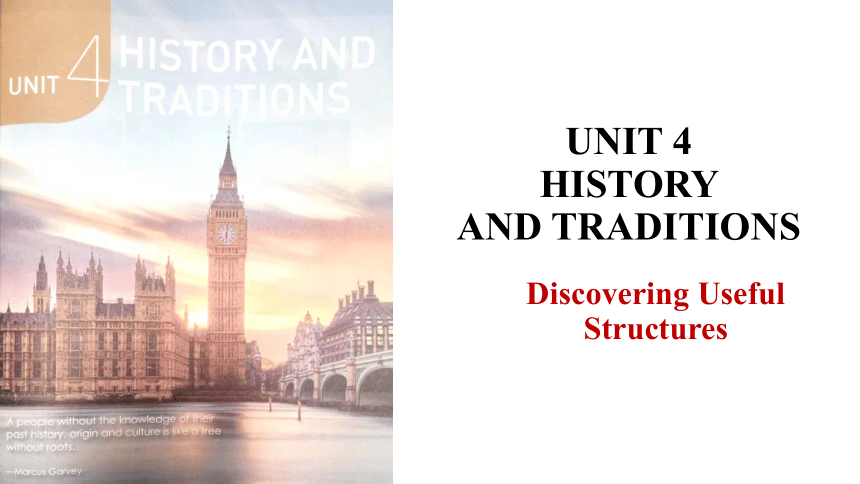 | |
| 格式 | pptx | ||
| 文件大小 | 2.7MB | ||
| 资源类型 | 教案 | ||
| 版本资源 | 人教版(2019) | ||
| 科目 | 英语 | ||
| 更新时间 | 2025-08-23 20:58:55 | ||
图片预览

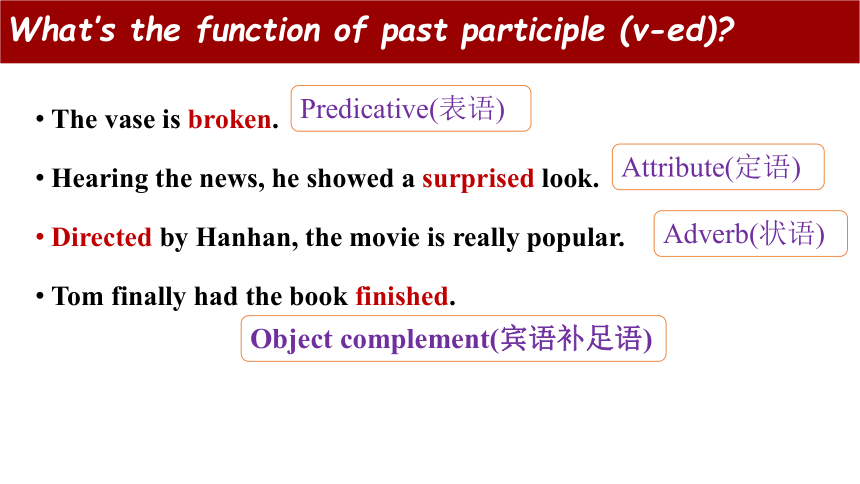
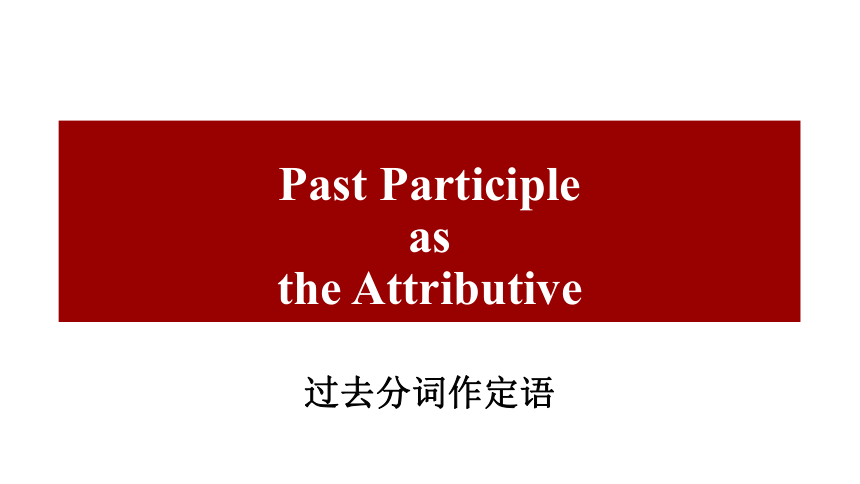
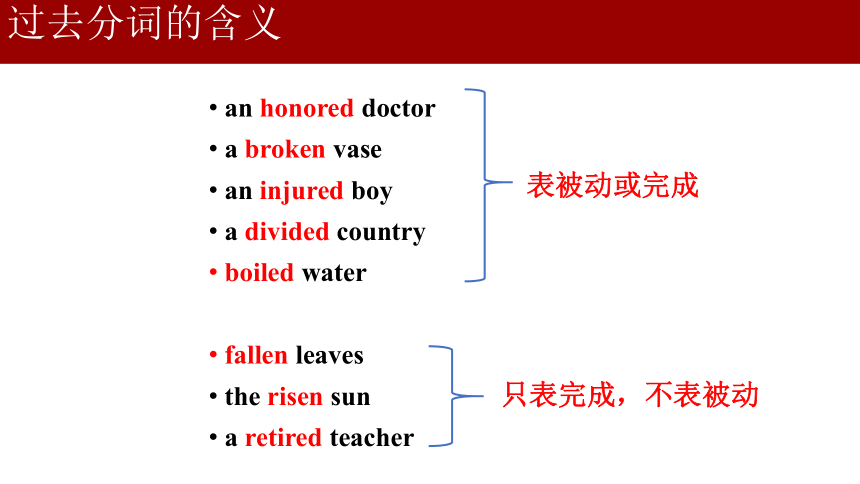
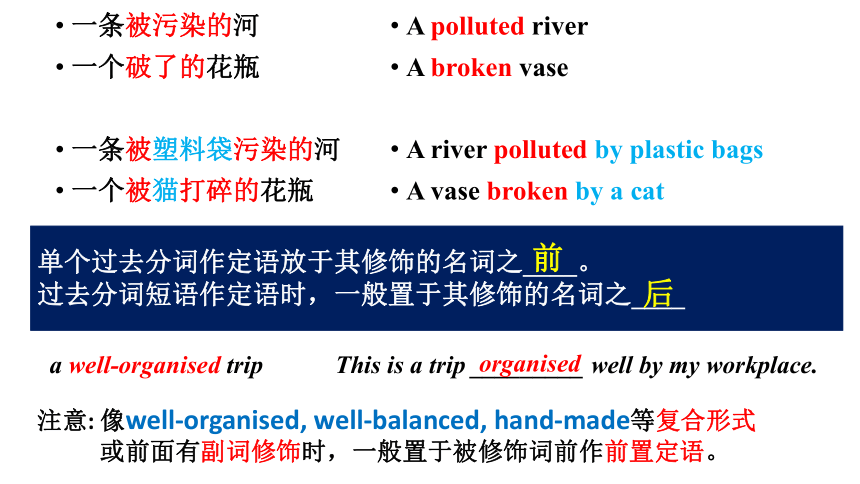
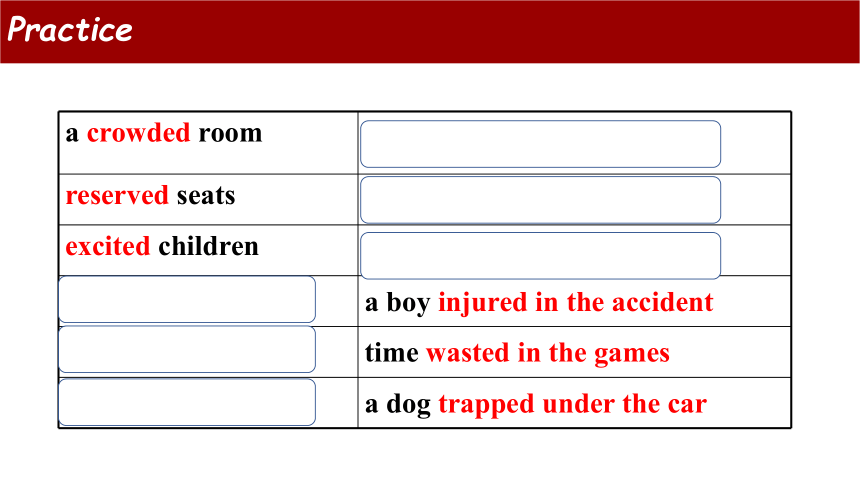
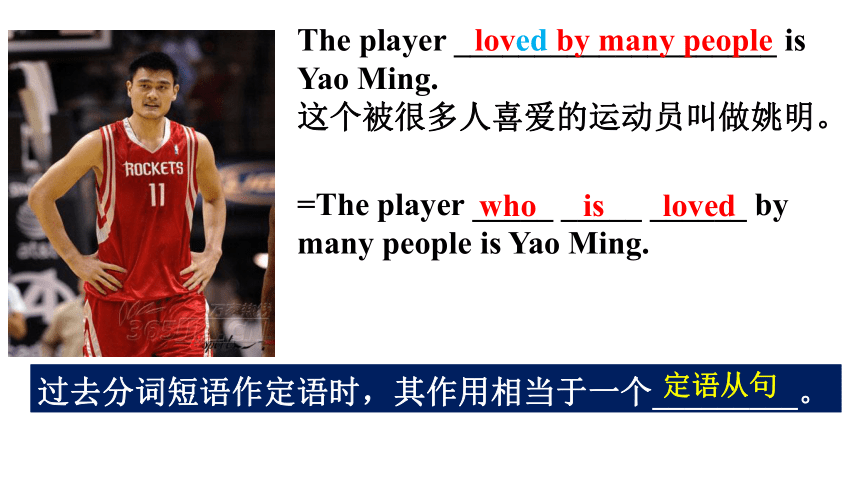
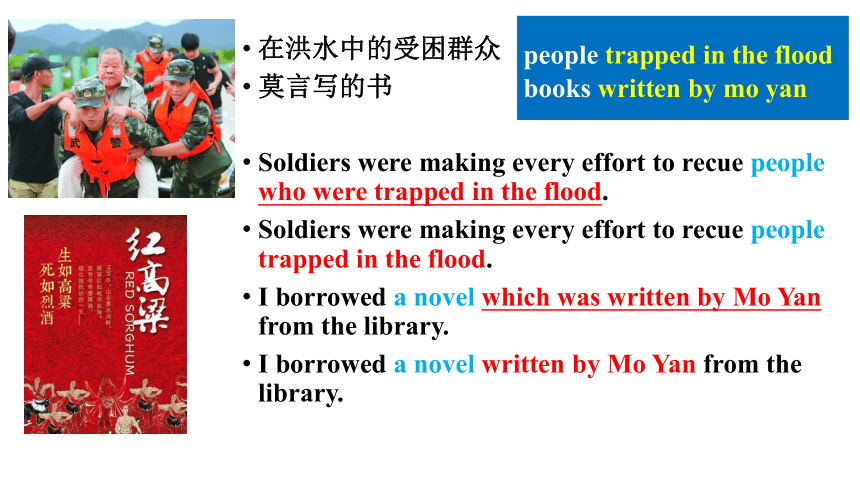
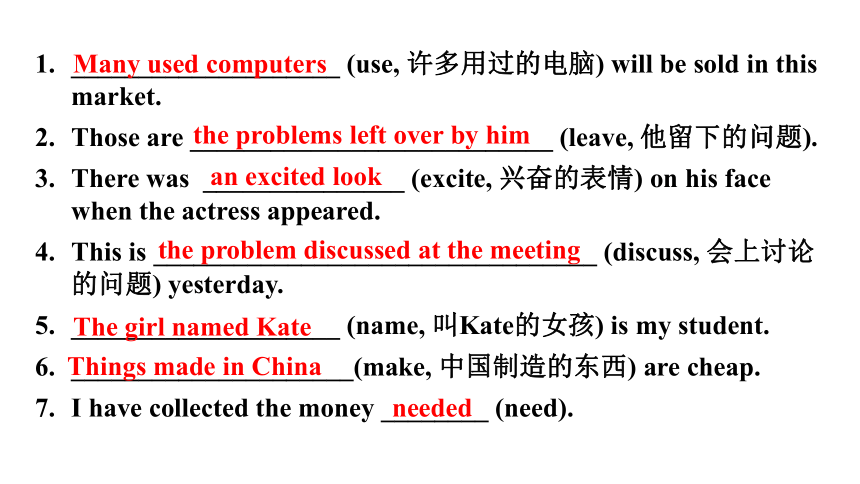
文档简介
(共25张PPT)
UNIT 4
HISTORY
AND TRADITIONS
Discovering Useful Structures
What’s the function of past participle (v-ed)
The vase is broken.
Hearing the news, he showed a surprised look.
Directed by Hanhan, the movie is really popular.
Tom finally had the book finished.
Predicative(表语)
Adverb(状语)
Attribute(定语)
Object complement(宾语补足语)
Past Participle
as
the Attributive
过去分词作定语
过去分词的含义
an honored doctor
a broken vase
an injured boy
a divided country
boiled water
fallen leaves
the risen sun
a retired teacher
表被动或完成
只表完成,不表被动
单个过去分词作定语放于其修饰的名词之____。
过去分词短语作定语时,一般置于其修饰的名词之____
一条被污染的河
一个破了的花瓶
一条被塑料袋污染的河
一个被猫打碎的花瓶
A polluted river
A broken vase
A river polluted by plastic bags
A vase broken by a cat
前
后
a well-organised trip
This is a trip _________ well by my workplace.
organised
注意: 像well-organised, well-balanced, hand-made等复合形式
或前面有副词修饰时,一般置于被修饰词前作前置定语。
Practice
a crowded room a room crowed with patients
reserved seats seats reserved for the Smiths
excited children children excited at the news
an injured boy a boy injured in the accident
wasted time time wasted in the games
a trapped dog a dog trapped under the car
=The player _____ _____ ______ by many people is Yao Ming.
The player ____________________ is Yao Ming.
这个被很多人喜爱的运动员叫做姚明。
who
loved
is
loved by many people
过去分词短语作定语时,其作用相当于一个_________。
定语从句
在洪水中的受困群众
莫言写的书
Soldiers were making every effort to recue people who were trapped in the flood.
Soldiers were making every effort to recue people trapped in the flood.
I borrowed a novel which was written by Mo Yan from the library.
I borrowed a novel written by Mo Yan from the library.
people trapped in the flood
books written by mo yan
____________________ (use, 许多用过的电脑) will be sold in this market.
Those are ___________________________ (leave, 他留下的问题).
There was _______________ (excite, 兴奋的表情) on his face when the actress appeared.
This is _________________________________ (discuss, 会上讨论的问题) yesterday.
____________________ (name, 叫Kate的女孩) is my student.
_____________________(make, 中国制造的东西) are cheap.
I have collected the money ________ (need).
Many used computers
the problems left over by him
an excited look
the problem discussed at the meeting
The girl named Kate
Things made in China
needed
Mary is one of those invited.
There was nobody punished here.
Is there anything unsolved
According to the information given, I have collected the stamps needed.
It is time for the departments concerned to take immediate measures to protect wildlives from dying out.
特殊情况:
1. 单个的过去分词修饰不定代词如something, everything, anything, nothing, nobody等或指示代词those时,常作后置定语。
2. 有些过去分词表示特定含义时,单独作定语也用作后置定语,如needed (需要的), left (剩余的),given (所给的), concerned (有关的)
过去分词(单个单词)作定语的位置——特殊情况
v-ing 和 v-ed 作定语的区别
the fallen leaves
the falling leaves
the boiled water
正在沸腾的水
烧开过的水
the boiling water
v-ed表示动作已经完成
v-ing表示动作正在进行
v-ing 和 v-ed 作定语的区别
This is a letter __________(write)in black ink.
There are so many people __________(show) interest in surfing the internet.
written
showing
v-ed与被修饰词之间构成动宾关系,即被动
v-ing与被修饰词之间构成主谓关系,即主动
The building built last year is our classroom building.
去年建造的楼是我们的教学楼。
The building being built now is our classroom building.
现在正在建造的楼是教学楼。
The building to be built next month is our classroom building.
下个月将要建造的楼是教学楼。
[即时训练] 用所给词的适当形式填空
①The cars ___________ (sell) at the market now are made in
Guangzhou.
②Tsinghua University, __________ (found) in 1911, is home to
a great number of outstanding figures.
③There are still many problems ____________ (solve) before we are ready for a long stay on the Moon.
being sold
founded
to be solved
Past Participle
as
the Object complement
过去分词作宾语补足语
What is the object complement
带有宾语补足语的一般句型为:
make,have,get,keep,leave等
+
直接宾语(名词或代词)
+
宾语补足语
Everyone calls him
(宾语)
(宾补)
(主语)
(谓语)
Tom.
宾语补足语一般放在宾语_________, 对宾语起____________的作用。
之后
补充说明
We must get the work finished by 10 o’clock.
He found his new bike stolen.
过去分词作宾语补足语,表示______ 或______ 的意义,有时候两者兼而有之。
被动
完成
I was glad to see the child well _______(take) care of.
When he arrived, he found all the work ________(finish).
1.v-ed用在表示感觉或心理状态的动词之后,如see, hear, feel, watch, notice, think, find等后面作宾语补足语,表示感受到某人或某物被……。
五看:see, watch, observe, look at, notice
二听:hear, listen to
一感觉:feel
finished
taken
Jack had his hair _______ yesterday.(cut)
I raised my voice to make myself _______. (hear)
2.v-ed用在表示使役的动词之后,如:get, let, make, have, keep等。
cut
heard
“have + 宾语+过去分词”的几种含义
1)意为“主语请别人做某事”。
He wants to have his eyes examined tomorrow.
2)意为“主语遭遇、遭受某一不愉快、不测的事情”。
Be careful, or you’ll have your hands hurt.
3)意为“使完成某事”,事情既可以是别人做完,也可以由主语参与完成。
He had the walls painted this morning.
The father wants his daughter _________ (teach) dancing.
He wants his writing ________ (read) by every classmate.
taught
read
3.v-ed用在表示“希望”“愿望”等意义的动词,如want, wish, like, expect等后面作宾语补足语,表示“希望/要求某人或某事被做”
With the problem _______(settle), he felt quite happy.
With many flowers ________ (plant) around the building, his house looks like a beautiful garden.
settled
planted
4.用于“with/without + 复合结构”中
with
宾语
宾补
ing
done
to do
形容词
副词
介词短语
The old man likes sleeping with the windows open.
She left the room with all the lights on.
The teacher came in with a book in hand.
With the man ________(lead) the way, we found the museum easily.
With so many children __________(laugh),I couldn't settle down to work.
With his money ______(use) up, he had to borrow.
He kept silent with his eyes________(focus) on the wall.
With a lot of work ________(do), I can't go to see a doctor.
leading
laughing
used
focused
to do
当他醒来时,他发现自己躺在医院里,被许多人围着。 (find+宾语+v-ed)
When he came to himself,
这个作者想尽办法让他新写的书出版。 (have+宾语+v-ed)
The writer made efforts to
他悄悄地走近房间,为了不让别人注意到他。 (make+宾语+v-ed)
He walked into the room quietly in order not to
he found himself ______ (lie) in hospital and _____________ (surround) by a lot of people.
lying
surrounded
have his newly written book___________(publish)
published
make himself _________(notice)
noticed
Practice
You can make yourself _____________ (understand) pretty well if you keep on speaking the language.
2. --- I can’t see the words on the blackboard.
--- Perhaps you need to have your eyes (examine) __________.
3. When I came in, I found him ______(lie) in bed.
4. We can hear the windows _______(beat)by the heavy rain drops.
5.His father had him ________ (read) all the morning.
6. With everything well__________ (arrange), he left the office
7. I couldn’t do my homework with all that noise _______ (go) on.
8. When he came to life, he found himself ______ (sit) on a chair, with his hands _____(tie) back.
lying
examined
understood
beaten
reading
arranged
sitting
tied
going
UNIT 4
HISTORY
AND TRADITIONS
Discovering Useful Structures
What’s the function of past participle (v-ed)
The vase is broken.
Hearing the news, he showed a surprised look.
Directed by Hanhan, the movie is really popular.
Tom finally had the book finished.
Predicative(表语)
Adverb(状语)
Attribute(定语)
Object complement(宾语补足语)
Past Participle
as
the Attributive
过去分词作定语
过去分词的含义
an honored doctor
a broken vase
an injured boy
a divided country
boiled water
fallen leaves
the risen sun
a retired teacher
表被动或完成
只表完成,不表被动
单个过去分词作定语放于其修饰的名词之____。
过去分词短语作定语时,一般置于其修饰的名词之____
一条被污染的河
一个破了的花瓶
一条被塑料袋污染的河
一个被猫打碎的花瓶
A polluted river
A broken vase
A river polluted by plastic bags
A vase broken by a cat
前
后
a well-organised trip
This is a trip _________ well by my workplace.
organised
注意: 像well-organised, well-balanced, hand-made等复合形式
或前面有副词修饰时,一般置于被修饰词前作前置定语。
Practice
a crowded room a room crowed with patients
reserved seats seats reserved for the Smiths
excited children children excited at the news
an injured boy a boy injured in the accident
wasted time time wasted in the games
a trapped dog a dog trapped under the car
=The player _____ _____ ______ by many people is Yao Ming.
The player ____________________ is Yao Ming.
这个被很多人喜爱的运动员叫做姚明。
who
loved
is
loved by many people
过去分词短语作定语时,其作用相当于一个_________。
定语从句
在洪水中的受困群众
莫言写的书
Soldiers were making every effort to recue people who were trapped in the flood.
Soldiers were making every effort to recue people trapped in the flood.
I borrowed a novel which was written by Mo Yan from the library.
I borrowed a novel written by Mo Yan from the library.
people trapped in the flood
books written by mo yan
____________________ (use, 许多用过的电脑) will be sold in this market.
Those are ___________________________ (leave, 他留下的问题).
There was _______________ (excite, 兴奋的表情) on his face when the actress appeared.
This is _________________________________ (discuss, 会上讨论的问题) yesterday.
____________________ (name, 叫Kate的女孩) is my student.
_____________________(make, 中国制造的东西) are cheap.
I have collected the money ________ (need).
Many used computers
the problems left over by him
an excited look
the problem discussed at the meeting
The girl named Kate
Things made in China
needed
Mary is one of those invited.
There was nobody punished here.
Is there anything unsolved
According to the information given, I have collected the stamps needed.
It is time for the departments concerned to take immediate measures to protect wildlives from dying out.
特殊情况:
1. 单个的过去分词修饰不定代词如something, everything, anything, nothing, nobody等或指示代词those时,常作后置定语。
2. 有些过去分词表示特定含义时,单独作定语也用作后置定语,如needed (需要的), left (剩余的),given (所给的), concerned (有关的)
过去分词(单个单词)作定语的位置——特殊情况
v-ing 和 v-ed 作定语的区别
the fallen leaves
the falling leaves
the boiled water
正在沸腾的水
烧开过的水
the boiling water
v-ed表示动作已经完成
v-ing表示动作正在进行
v-ing 和 v-ed 作定语的区别
This is a letter __________(write)in black ink.
There are so many people __________(show) interest in surfing the internet.
written
showing
v-ed与被修饰词之间构成动宾关系,即被动
v-ing与被修饰词之间构成主谓关系,即主动
The building built last year is our classroom building.
去年建造的楼是我们的教学楼。
The building being built now is our classroom building.
现在正在建造的楼是教学楼。
The building to be built next month is our classroom building.
下个月将要建造的楼是教学楼。
[即时训练] 用所给词的适当形式填空
①The cars ___________ (sell) at the market now are made in
Guangzhou.
②Tsinghua University, __________ (found) in 1911, is home to
a great number of outstanding figures.
③There are still many problems ____________ (solve) before we are ready for a long stay on the Moon.
being sold
founded
to be solved
Past Participle
as
the Object complement
过去分词作宾语补足语
What is the object complement
带有宾语补足语的一般句型为:
make,have,get,keep,leave等
+
直接宾语(名词或代词)
+
宾语补足语
Everyone calls him
(宾语)
(宾补)
(主语)
(谓语)
Tom.
宾语补足语一般放在宾语_________, 对宾语起____________的作用。
之后
补充说明
We must get the work finished by 10 o’clock.
He found his new bike stolen.
过去分词作宾语补足语,表示______ 或______ 的意义,有时候两者兼而有之。
被动
完成
I was glad to see the child well _______(take) care of.
When he arrived, he found all the work ________(finish).
1.v-ed用在表示感觉或心理状态的动词之后,如see, hear, feel, watch, notice, think, find等后面作宾语补足语,表示感受到某人或某物被……。
五看:see, watch, observe, look at, notice
二听:hear, listen to
一感觉:feel
finished
taken
Jack had his hair _______ yesterday.(cut)
I raised my voice to make myself _______. (hear)
2.v-ed用在表示使役的动词之后,如:get, let, make, have, keep等。
cut
heard
“have + 宾语+过去分词”的几种含义
1)意为“主语请别人做某事”。
He wants to have his eyes examined tomorrow.
2)意为“主语遭遇、遭受某一不愉快、不测的事情”。
Be careful, or you’ll have your hands hurt.
3)意为“使完成某事”,事情既可以是别人做完,也可以由主语参与完成。
He had the walls painted this morning.
The father wants his daughter _________ (teach) dancing.
He wants his writing ________ (read) by every classmate.
taught
read
3.v-ed用在表示“希望”“愿望”等意义的动词,如want, wish, like, expect等后面作宾语补足语,表示“希望/要求某人或某事被做”
With the problem _______(settle), he felt quite happy.
With many flowers ________ (plant) around the building, his house looks like a beautiful garden.
settled
planted
4.用于“with/without + 复合结构”中
with
宾语
宾补
ing
done
to do
形容词
副词
介词短语
The old man likes sleeping with the windows open.
She left the room with all the lights on.
The teacher came in with a book in hand.
With the man ________(lead) the way, we found the museum easily.
With so many children __________(laugh),I couldn't settle down to work.
With his money ______(use) up, he had to borrow.
He kept silent with his eyes________(focus) on the wall.
With a lot of work ________(do), I can't go to see a doctor.
leading
laughing
used
focused
to do
当他醒来时,他发现自己躺在医院里,被许多人围着。 (find+宾语+v-ed)
When he came to himself,
这个作者想尽办法让他新写的书出版。 (have+宾语+v-ed)
The writer made efforts to
他悄悄地走近房间,为了不让别人注意到他。 (make+宾语+v-ed)
He walked into the room quietly in order not to
he found himself ______ (lie) in hospital and _____________ (surround) by a lot of people.
lying
surrounded
have his newly written book___________(publish)
published
make himself _________(notice)
noticed
Practice
You can make yourself _____________ (understand) pretty well if you keep on speaking the language.
2. --- I can’t see the words on the blackboard.
--- Perhaps you need to have your eyes (examine) __________.
3. When I came in, I found him ______(lie) in bed.
4. We can hear the windows _______(beat)by the heavy rain drops.
5.His father had him ________ (read) all the morning.
6. With everything well__________ (arrange), he left the office
7. I couldn’t do my homework with all that noise _______ (go) on.
8. When he came to life, he found himself ______ (sit) on a chair, with his hands _____(tie) back.
lying
examined
understood
beaten
reading
arranged
sitting
tied
going
